英语小话剧总结
- 格式:doc
- 大小:20.50 KB
- 文档页数:1
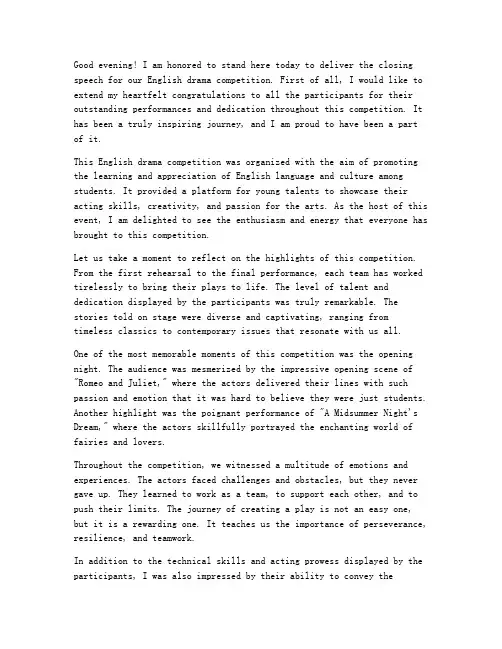
Good evening! I am honored to stand here today to deliver the closing speech for our English drama competition. First of all, I would like to extend my heartfelt congratulations to all the participants for their outstanding performances and dedication throughout this competition. It has been a truly inspiring journey, and I am proud to have been a part of it.This English drama competition was organized with the aim of promoting the learning and appreciation of English language and culture among students. It provided a platform for young talents to showcase their acting skills, creativity, and passion for the arts. As the host of this event, I am delighted to see the enthusiasm and energy that everyone has brought to this competition.Let us take a moment to reflect on the highlights of this competition. From the first rehearsal to the final performance, each team has worked tirelessly to bring their plays to life. The level of talent and dedication displayed by the participants was truly remarkable. The stories told on stage were diverse and captivating, ranging from timeless classics to contemporary issues that resonate with us all.One of the most memorable moments of this competition was the opening night. The audience was mesmerized by the impressive opening scene of "Romeo and Juliet," where the actors delivered their lines with such passion and emotion that it was hard to believe they were just students. Another highlight was the poignant performance of "A Midsummer Night's Dream," where the actors skillfully portrayed the enchanting world of fairies and lovers.Throughout the competition, we witnessed a multitude of emotions and experiences. The actors faced challenges and obstacles, but they never gave up. They learned to work as a team, to support each other, and to push their limits. The journey of creating a play is not an easy one, but it is a rewarding one. It teaches us the importance of perseverance, resilience, and teamwork.In addition to the technical skills and acting prowess displayed by the participants, I was also impressed by their ability to convey theessence of the plays they performed. They brought to life the characters and stories in a way that made the audience feel connected and engaged. The actors not only acted, but they also told us a story, touched our hearts, and made us think.This competition has not only showcased the talent of our students but also highlighted the importance of language learning. English is a global language, and being proficient in it opens up numerous opportunities for personal and professional growth. It is through language that we can communicate, connect, and understand each other. The participants of this competition have demonstrated that they are not only skilled actors but also language learners who are eager to explore and appreciate the world beyond their own.As we come to the end of this competition, I would like to take this opportunity to express my gratitude to all the organizers, teachers, and volunteers who have contributed to the success of this event. Your dedication and hard work have made this competition possible. I would also like to thank the parents and guardians for supporting their children and encouraging them to participate in this exciting journey.To the winners, I extend my sincere congratulations. Your hard work and dedication have paid off, and you have truly earned your success. To the runners-up and participants, I want to say that every performance is a victory. You have all grown as individuals and as artists through this experience. Remember that the journey is more important than the destination, and your journey has been extraordinary.In conclusion, this English drama competition has been a remarkable event that has brought together students, teachers, and parents in a celebration of the arts and language. It has been a testament to the power of creativity, dedication, and teamwork. I hope that everyone who has been a part of this competition will carry forward the spirit of enthusiasm and passion for the arts and language that we have witnessed here.As we bid farewell to this competition, let us remember the memories, friendships, and lessons that we have gained. Let us continue to supportand encourage each other in our language learning and artistic pursuits. And let us never forget the joy and excitement that come from sharing our talents and passions with others.Thank you, and I wish everyone a wonderful evening!。

在英语舞台剧实践中,我收获了许多宝贵的经验和教训。
以下是我对这次实践的总结和一些建议。
首先,通过参与英语舞台剧实践,我提高了自己的英语口语能力。
在排练和表演的过程中,我需要与其他演员进行对话,用英语来表达角色的情感和意图。
这种实践是对课堂学习的补充,我学到了很多在课本上无法学到的口语表达和交流技巧。
其次,通过实践,我学会了如何合作和团队精神。
在舞台剧中,每个角色都是非常重要的,没有哪个角色可以独自完成整个剧目。
因此,我们必须互相合作,共同努力,才能达到良好的效果。
我学会了倾听和尊重他人的意见,以及在困难和挑战面前保持积极的心态。
此外,英语舞台剧实践也让我更好地理解了戏剧的艺术形式。
在排练和演出中,我注意到了舞台效果、表演技巧和剧本的设计等方面的重要性。
我也意识到了演员的角色塑造和情感表达的重要性,以及如何通过肢体语言和表情来传达角色的内心世界。
然而,参与英语舞台剧实践也让我面临了一些困难和挑战。
首先,英语不是我的母语,所以在记忆和理解剧本时遇到了困难。
我需要花更多的时间来熟悉剧本和学习台词。
其次,演员之间的合作和配合也是一个挑战。
有时候,我们在排练中会出现沟通问题和分歧,但通过交流和妥协,我们最终解决了问题。
针对以上的经验和教训,我有以下几点建议。
首先,为了提高英语口语能力,我建议多参与口语练习和演讲活动。
这样可以锻炼自己的表达能力和自信心。
其次,关于团队合作,我建议提前制定合作规则和目标,明确每个人的责任和角色。
这样可以确保团队在排练和表演中有一个清晰的方向。
最后,我建议在实践过程中保持积极的心态,面对挑战时不要轻易放弃。
实践是一个学习和成长的过程,通过努力和经验积累,我们可以取得进步。
总之,参与英语舞台剧实践是一次宝贵的经历,让我提高了英语口语能力,学会了团队合作和戏剧表演技巧。
我相信这种实践不仅可以提高我的英语能力,也可以培养我在团队合作和艺术表达方面的能力。
我希望将来还能有更多的机会参与类似的实践活动,不断提高自己的英语水平和戏剧表演技巧。
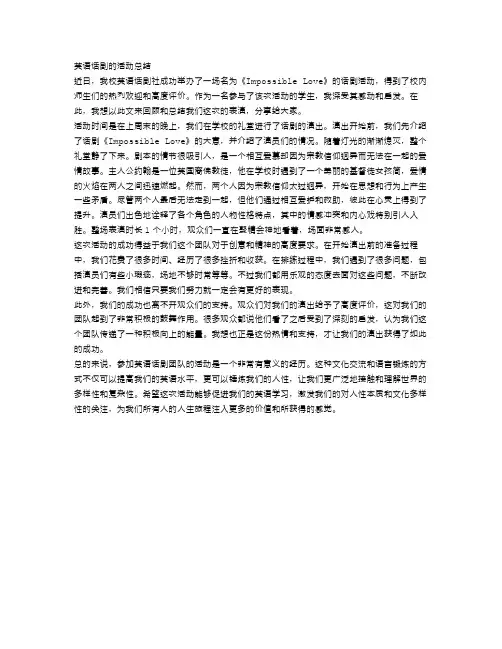
英语话剧的活动总结近日,我校英语话剧社成功举办了一场名为《Impossible Love》的话剧活动,得到了校内师生们的热烈欢迎和高度评价。
作为一名参与了该次活动的学生,我深受其感动和启发。
在此,我想以此文来回顾和总结我们这次的表演,分享给大家。
活动时间是在上周末的晚上,我们在学校的礼堂进行了话剧的演出。
演出开始前,我们先介绍了话剧《Impossible Love》的大意,并介绍了演员们的情况。
随着灯光的渐渐熄灭,整个礼堂静了下来。
剧本的情节很吸引人,是一个相互爱慕却因为宗教信仰迥异而无法在一起的爱情故事。
主人公约翰是一位英国裔佛教徒,他在学校时遇到了一个美丽的基督徒女孩简,爱情的火焰在两人之间迅速燃起。
然而,两个人因为宗教信仰太过迥异,开始在思想和行为上产生一些矛盾。
尽管两个人最后无法走到一起,但他们通过相互爱护和救助,彼此在心灵上得到了提升。
演员们出色地诠释了各个角色的人物性格特点,其中的情感冲突和内心戏特别引人入胜。
整场表演时长1个小时,观众们一直在聚精会神地看着,场面非常感人。
这次活动的成功得益于我们这个团队对于创意和精神的高度要求。
在开始演出前的准备过程中,我们花费了很多时间、经历了很多挫折和收获。
在排练过程中,我们遇到了很多问题,包括演员们有些小瑕疵,场地不够时常等等。
不过我们都用乐观的态度去面对这些问题,不断改进和完善。
我们相信只要我们努力就一定会有更好的表现。
此外,我们的成功也离不开观众们的支持。
观众们对我们的演出给予了高度评价,这对我们的团队起到了非常积极的鼓舞作用。
很多观众都说他们看了之后受到了深刻的启发,认为我们这个团队传递了一种积极向上的能量。
我想也正是这份热情和支持,才让我们的演出获得了如此的成功。
总的来说,参加英语话剧团队的活动是一个非常有意义的经历。
这种文化交流和语言锻炼的方式不仅可以提高我们的英语水平,更可以锤炼我们的人性,让我们更广泛地接触和理解世界的多样性和复杂性。
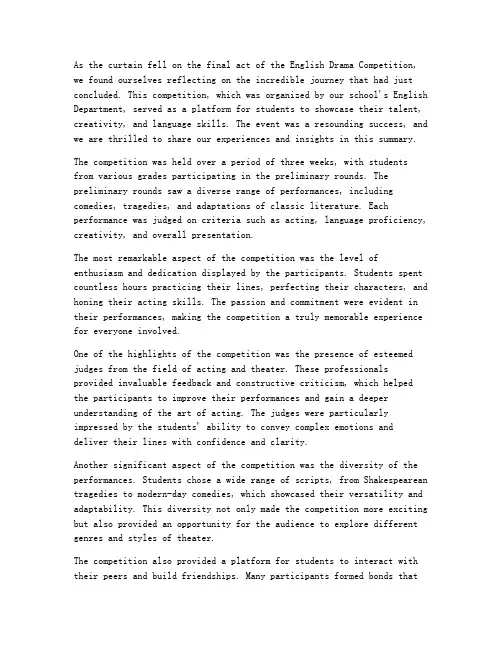
As the curtain fell on the final act of the English Drama Competition, we found ourselves reflecting on the incredible journey that had just concluded. This competition, which was organized by our school's English Department, served as a platform for students to showcase their talent, creativity, and language skills. The event was a resounding success, and we are thrilled to share our experiences and insights in this summary.The competition was held over a period of three weeks, with students from various grades participating in the preliminary rounds. The preliminary rounds saw a diverse range of performances, including comedies, tragedies, and adaptations of classic literature. Each performance was judged on criteria such as acting, language proficiency, creativity, and overall presentation.The most remarkable aspect of the competition was the level of enthusiasm and dedication displayed by the participants. Students spent countless hours practicing their lines, perfecting their characters, and honing their acting skills. The passion and commitment were evident in their performances, making the competition a truly memorable experience for everyone involved.One of the highlights of the competition was the presence of esteemed judges from the field of acting and theater. These professionals provided invaluable feedback and constructive criticism, which helped the participants to improve their performances and gain a deeper understanding of the art of acting. The judges were particularly impressed by the students' ability to convey complex emotions anddeliver their lines with confidence and clarity.Another significant aspect of the competition was the diversity of the performances. Students chose a wide range of scripts, from Shakespearean tragedies to modern-day comedies, which showcased their versatility and adaptability. This diversity not only made the competition more exciting but also provided an opportunity for the audience to explore different genres and styles of theater.The competition also provided a platform for students to interact with their peers and build friendships. Many participants formed bonds thatextended beyond the competition, and we believe that these connections will be beneficial in their academic and personal lives.In the final round, the participants delivered their performances with such passion and conviction that the audience was captivated from start to finish. The winners were announced, and the recipients of the awards were truly deserving of their accolades. Their hard work and dedication were evident in their performances, and they served as an inspiration to their fellow students.As we reflect on the English Drama Competition, we are reminded of the importance of the arts in education. The competition not only helped students to develop their language skills and acting abilities but also instilled in them a sense of confidence and self-expression. It was a powerful reminder that the arts have the power to transform lives and foster a sense of community.In conclusion, the English Drama Competition was a resounding success that provided a platform for students to showcase their talent, creativity, and language skills. The competition not only helped students to improve their acting abilities but also fostered a sense of community and appreciation for the arts. We are grateful to the organizers, judges, and participants for making this event a memorable and enriching experience for everyone involved.。

小学英语童话剧表演活动在XX月X日,我校成功举办了一场精彩纷呈的小学英语童话剧表演活动。
此次活动旨在提高学生的英语学习兴趣,培养他们的口语表达能力、团队合作精神和创造力。
活动得到了广大师生的积极响应和参与,取得了圆满成功。
现将本次活动总结如下:一、活动筹备1.教师精心选择适合小学生的英语童话剧本,如《SnowWhite》《TheThreeLittlePigs》等,确保剧本内容生动有趣、语言简单易懂。
2.组织学生进行角色选拔,鼓励学生积极参与,根据学生的英语水平和表演能力分配角色。
3.安排排练时间,利用课余时间和社团活动时间进行排练,教师对学生的表演进行耐心指导,包括发音、语调、表情和动作等方面。
二、活动过程1.表演当天,学生们身着精美的服装,化着可爱的妆容,充满自信地登上舞台。
他们用流利的英语、生动的表演和丰富的表情,将一个个童话故事演绎得活灵活现。
2.舞台布置精美,道具准备充分,为表演增添了不少色彩。
音乐和灯光的配合也恰到好处,营造出了良好的氛围。
3.评委们根据学生的表演内容、语言表达、表演技巧和团队合作等方面进行了公正的评分,评选出了一、二、三等奖和优秀奖。
三、活动效果1.提高了学生的英语学习兴趣。
通过参与童话剧表演,学生们在轻松愉快的氛围中学习英语,提高了口语表达能力,增强了学习英语的自信心。
2.培养了学生的团队合作精神。
在排练和表演过程中,学生们需要相互配合、互相支持,共同完成表演任务。
这不仅提高了他们的团队合作能力,还增进了同学之间的友谊。
3.锻炼了学生的创造力和表现力。
学生们在表演中发挥自己的想象力,设计角色的服装、动作和表情,展现了自己的创造力和表现力。
4.丰富了校园文化生活。
此次英语童话剧表演活动为学生们提供了一个展示自我的平台,丰富了校园文化生活,营造了浓厚的英语学习氛围。
四、不足之处1.部分学生的英语发音不够准确,需要进一步加强语音训练。
2.表演时间安排不够合理,有些节目时间过长,影响了整个活动的进度。
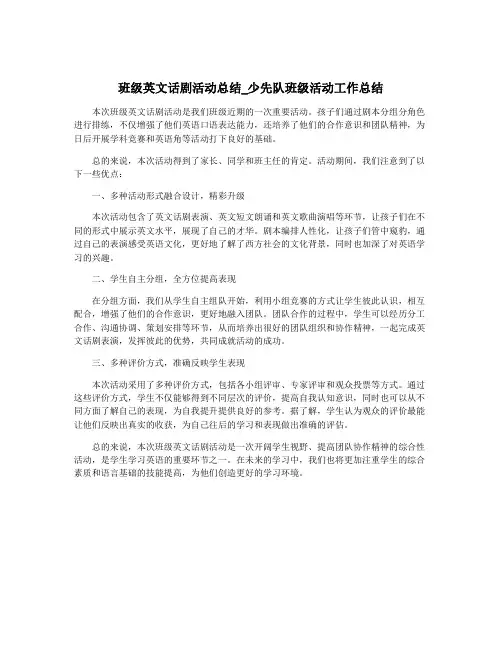
班级英文话剧活动总结_少先队班级活动工作总结本次班级英文话剧活动是我们班级近期的一次重要活动。
孩子们通过剧本分组分角色进行排练,不仅增强了他们英语口语表达能力,还培养了他们的合作意识和团队精神,为日后开展学科竞赛和英语角等活动打下良好的基础。
总的来说,本次活动得到了家长、同学和班主任的肯定。
活动期间,我们注意到了以下一些优点:一、多种活动形式融合设计,精彩升级本次活动包含了英文话剧表演、英文短文朗诵和英文歌曲演唱等环节,让孩子们在不同的形式中展示英文水平,展现了自己的才华。
剧本编排人性化,让孩子们管中窥豹,通过自己的表演感受英语文化,更好地了解了西方社会的文化背景,同时也加深了对英语学习的兴趣。
二、学生自主分组,全方位提高表现在分组方面,我们从学生自主组队开始,利用小组竞赛的方式让学生彼此认识,相互配合,增强了他们的合作意识,更好地融入团队。
团队合作的过程中,学生可以经历分工合作、沟通协调、策划安排等环节,从而培养出很好的团队组织和协作精神,一起完成英文话剧表演,发挥彼此的优势,共同成就活动的成功。
三、多种评价方式,准确反映学生表现本次活动采用了多种评价方式,包括各小组评审、专家评审和观众投票等方式。
通过这些评价方式,学生不仅能够得到不同层次的评价,提高自我认知意识,同时也可以从不同方面了解自己的表现,为自我提升提供良好的参考。
据了解,学生认为观众的评价最能让他们反映出真实的收获,为自己往后的学习和表现做出准确的评估。
总的来说,本次班级英文话剧活动是一次开阔学生视野、提高团队协作精神的综合性活动,是学生学习英语的重要环节之一。
在未来的学习中,我们也将更加注重学生的综合素质和语言基础的技能提高,为他们创造更好的学习环境。
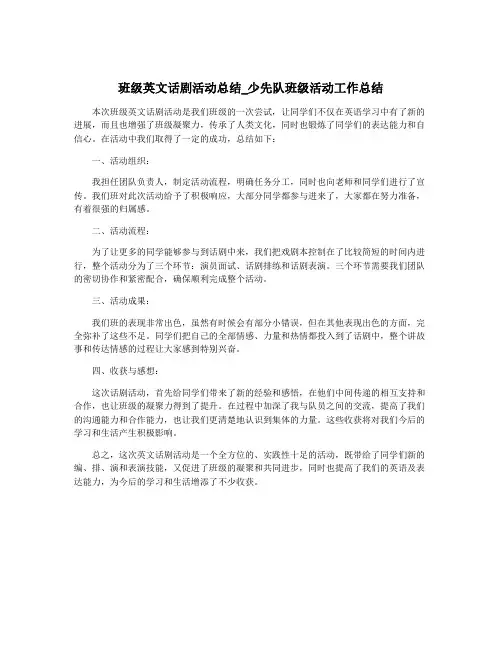
班级英文话剧活动总结_少先队班级活动工作总结
本次班级英文话剧活动是我们班级的一次尝试,让同学们不仅在英语学习中有了新的进展,而且也增强了班级凝聚力,传承了人类文化,同时也锻炼了同学们的表达能力和自信心。
在活动中我们取得了一定的成功,总结如下:
一、活动组织:
我担任团队负责人,制定活动流程,明确任务分工,同时也向老师和同学们进行了宣传。
我们班对此次活动给予了积极响应,大部分同学都参与进来了,大家都在努力准备,有着很强的归属感。
二、活动流程:
为了让更多的同学能够参与到话剧中来,我们把戏剧本控制在了比较简短的时间内进行,整个活动分为了三个环节:演员面试、话剧排练和话剧表演。
三个环节需要我们团队的密切协作和紧密配合,确保顺利完成整个活动。
三、活动成果:
我们班的表现非常出色,虽然有时候会有部分小错误,但在其他表现出色的方面,完全弥补了这些不足。
同学们把自己的全部情感、力量和热情都投入到了话剧中,整个讲故事和传达情感的过程让大家感到特别兴奋。
四、收获与感想:
这次话剧活动,首先给同学们带来了新的经验和感悟,在他们中间传递的相互支持和合作,也让班级的凝聚力得到了提升。
在过程中加深了我与队员之间的交流,提高了我们的沟通能力和合作能力,也让我们更清楚地认识到集体的力量。
这些收获将对我们今后的学习和生活产生积极影响。
总之,这次英文话剧活动是一个全方位的、实践性十足的活动,既带给了同学们新的编、排、演和表演技能,又促进了班级的凝聚和共同进步,同时也提高了我们的英语及表达能力,为今后的学习和生活增添了不少收获。
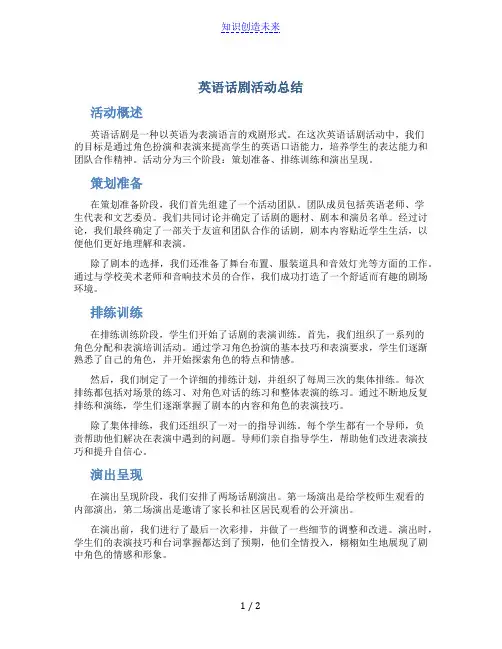
英语话剧活动总结活动概述英语话剧是一种以英语为表演语言的戏剧形式。
在这次英语话剧活动中,我们的目标是通过角色扮演和表演来提高学生的英语口语能力,培养学生的表达能力和团队合作精神。
活动分为三个阶段:策划准备、排练训练和演出呈现。
策划准备在策划准备阶段,我们首先组建了一个活动团队。
团队成员包括英语老师、学生代表和文艺委员。
我们共同讨论并确定了话剧的题材、剧本和演员名单。
经过讨论,我们最终确定了一部关于友谊和团队合作的话剧,剧本内容贴近学生生活,以便他们更好地理解和表演。
除了剧本的选择,我们还准备了舞台布置、服装道具和音效灯光等方面的工作。
通过与学校美术老师和音响技术员的合作,我们成功打造了一个舒适而有趣的剧场环境。
排练训练在排练训练阶段,学生们开始了话剧的表演训练。
首先,我们组织了一系列的角色分配和表演培训活动。
通过学习角色扮演的基本技巧和表演要求,学生们逐渐熟悉了自己的角色,并开始探索角色的特点和情感。
然后,我们制定了一个详细的排练计划,并组织了每周三次的集体排练。
每次排练都包括对场景的练习、对角色对话的练习和整体表演的练习。
通过不断地反复排练和演练,学生们逐渐掌握了剧本的内容和角色的表演技巧。
除了集体排练,我们还组织了一对一的指导训练。
每个学生都有一个导师,负责帮助他们解决在表演中遇到的问题。
导师们亲自指导学生,帮助他们改进表演技巧和提升自信心。
演出呈现在演出呈现阶段,我们安排了两场话剧演出。
第一场演出是给学校师生观看的内部演出,第二场演出是邀请了家长和社区居民观看的公开演出。
在演出前,我们进行了最后一次彩排,并做了一些细节的调整和改进。
演出时,学生们的表演技巧和台词掌握都达到了预期,他们全情投入,栩栩如生地展现了剧中角色的情感和形象。
演出结束后,我们组织了一次反思会议,学生们分享自己的收获和体验。
大家一致认为,通过这次英语话剧活动,不仅提高了英语口语能力,还培养了表达能力和团队合作精神。
同时,他们也感受到了戏剧艺术的魅力和潜力。
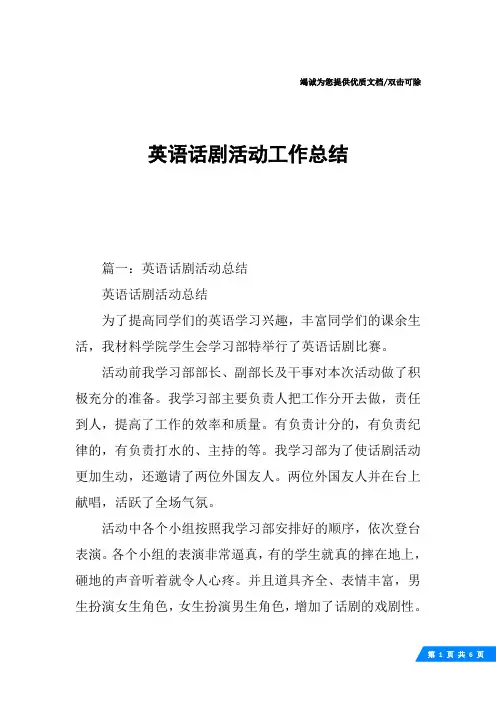
竭诚为您提供优质文档/双击可除英语话剧活动工作总结篇一:英语话剧活动总结英语话剧活动总结为了提高同学们的英语学习兴趣,丰富同学们的课余生活,我材料学院学生会学习部特举行了英语话剧比赛。
活动前我学习部部长、副部长及干事对本次活动做了积极充分的准备。
我学习部主要负责人把工作分开去做,责任到人,提高了工作的效率和质量。
有负责计分的,有负责纪律的,有负责打水的、主持的等。
我学习部为了使话剧活动更加生动,还邀请了两位外国友人。
两位外国友人并在台上献唱,活跃了全场气氛。
活动中各个小组按照我学习部安排好的顺序,依次登台表演。
各个小组的表演非常逼真,有的学生就真的摔在地上,砸地的声音听着就令人心疼。
并且道具齐全、表情丰富,男生扮演女生角色,女生扮演男生角色,增加了话剧的戏剧性。
博得了观众的阵阵喝彩。
其中《大话西游之三打白骨精》、《灰姑娘的生日》、《天下无贼》、《白雪公主与七个小矮人》等诸多童话和影视节目改变的话剧都得到同学们的好评。
演员们使出全身解数使自己小组的话剧更加精彩出众。
唱、跳、打各种动作应有尽有。
一小组沙僧的佛珠(用山楂穿成的)赠送给了我们的外国友人。
我们的外国友人并登台献唱,让我们听到原汁原味的英语和英语歌曲。
我学习部在活动中维持了良好的秩序。
各项活动都稳步的进行。
在此次活动中大二学生总体比大一学生做的要好,希望大二学生继续发扬,大一学生从中吸取经验,在下一年参加时表现的更加完美。
活动完美结束后,我学习部做好了各项收尾工作,此次活动的顺利进行,在于各位评委的大力帮助和同学们的积极配合。
我学习部在以后活动中再接再厉,做的更好、更完美。
材料学院学习部20XX-12-1篇二:20XX-20XX英语话剧班总结20XX——20XX学年度五动空间英语童话剧班总结通过一学年五动空间课程英语童话剧班的学习和交流,学生在欣赏,选择,编排剧目的过程中,不仅认识了很多优秀的童话剧目,同时师生合作创设了《cinderella》灰姑娘的剧本,并且进行了排练。
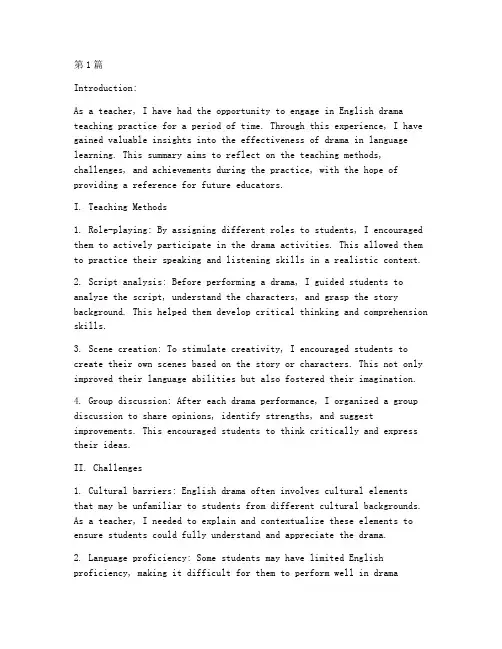
第1篇Introduction:As a teacher, I have had the opportunity to engage in English drama teaching practice for a period of time. Through this experience, I have gained valuable insights into the effectiveness of drama in language learning. This summary aims to reflect on the teaching methods, challenges, and achievements during the practice, with the hope of providing a reference for future educators.I. Teaching Methods1. Role-playing: By assigning different roles to students, I encouraged them to actively participate in the drama activities. This allowed them to practice their speaking and listening skills in a realistic context.2. Script analysis: Before performing a drama, I guided students to analyze the script, understand the characters, and grasp the story background. This helped them develop critical thinking and comprehension skills.3. Scene creation: To stimulate creativity, I encouraged students to create their own scenes based on the story or characters. This not only improved their language abilities but also fostered their imagination.4. Group discussion: After each drama performance, I organized a group discussion to share opinions, identify strengths, and suggest improvements. This encouraged students to think critically and express their ideas.II. Challenges1. Cultural barriers: English drama often involves cultural elementsthat may be unfamiliar to students from different cultural backgrounds. As a teacher, I needed to explain and contextualize these elements to ensure students could fully understand and appreciate the drama.2. Language proficiency: Some students may have limited English proficiency, making it difficult for them to perform well in dramaactivities. In this case, I adjusted the difficulty level of the drama scripts and provided additional language support.3. Time management: English drama teaching requires a considerable amount of time for preparation, rehearsal, and performance. Balancing this with other subjects can be challenging.III. Achievements1. Improved language skills: Through drama, students had the chance to practice speaking, listening, reading, and writing in a real-life context. This significantly improved their overall language proficiency.2. Enhanced communication abilities: Drama encouraged students to express themselves, listen to others, and collaborate with their peers. This helped them develop strong communication skills.3. Increased confidence: Performing in front of an audience can be intimidating for some students. However, with proper guidance and encouragement, many students gained confidence and improved their self-esteem.4. Better understanding of cultural differences: By engaging in English drama, students gained a deeper understanding of different cultures, fostering tolerance and respect for diversity.Conclusion:English drama teaching practice has been a rewarding experience for both students and teachers. It offers a unique and effective way to enhance language learning. By utilizing various teaching methods, addressing challenges, and celebrating achievements, we can create a positive and engaging learning environment. As educators, we should continue to explore and implement drama in our language teaching practices, ultimately fostering well-rounded, confident, and culturally aware learners.第2篇IntroductionThe integration of drama into English language teaching has been a transformative approach that enhances students' language skills,critical thinking, and cultural understanding. This summary reflects on a semester-long drama teaching practice, highlighting the methodologies employed, student outcomes, and personal reflections.MethodologyThe drama teaching practice was conducted in a secondary school English classroom, with a focus on students aged 14-16. The following methodologies were employed:1. Script Analysis: Students were provided with a variety of scripts, ranging from classic literature to contemporary plays. They were encouraged to analyze the characters, themes, and language used in the scripts.2. Role Play: Students were assigned roles from the scripts and were expected to perform them in front of the class. This activity aimed to improve their pronunciation, intonation, and fluency.3. Improvisation: Students were engaged in improvisation exercises to enhance their creativity and spontaneity. These activities often required them to think on their feet and respond to unexpected situations.4. Group Work: Collaborative projects were introduced to foster teamwork and communication skills. Students worked in groups to create their own short plays, which were then presented to the class.5. Feedback and Reflection: Regular feedback sessions were conducted to provide students with constructive criticism and encourage self-reflection. This was crucial in helping them identify areas for improvement.Student OutcomesThe drama teaching practice yielded several positive outcomes among the students:1. Improved Language Skills: Students demonstrated significant improvements in their speaking, listening, reading, and writing skills. The use of scripts and role play activities allowed them to practice and refine their language use in a more interactive and engaging manner.2. Increased Confidence: Many students reported feeling more confident in their English speaking abilities. The supportive classroom environment and the encouragement to participate in group activities played a vital role in building their self-esteem.3. Enhanced Creativity: The improvisation exercises and group projects allowed students to express their creativity and think outside the box. This not only enriched their learning experience but also encouraged them to explore different perspectives.4. Better Understanding of Cultural Contexts: By analyzing scripts from various cultural backgrounds, students gained a deeper understanding of different societies and their values. This fostered cultural empathy and sensitivity.ReflectionsAs an English teacher, the drama teaching practice was a rewarding experience. Here are some reflections on the process:1. Flexibility: One of the challenges was managing the diverse needs of the students. However, this also allowed me to be more flexible and adapt my teaching methods accordingly.2. Engagement: The inclusion of drama in the English curriculum significantly increased student engagement. The interactive nature of drama activities made learning more enjoyable and memorable.3. Feedback: Providing regular feedback was crucial in helping students improve. It also allowed me to gain insights into their strengths and weaknesses, which I could then address in my teaching.4. Continuous Learning: As a teacher, I learned a lot from this experience. It helped me to refine my drama skills and develop new teaching strategies.ConclusionIn conclusion, the drama teaching practice in English language teaching has been a highly effective approach. It not only improved the students' language skills but also fostered their creativity, confidence, and cultural understanding. As educators, we should continue to explore and integrate drama into our teaching practices to create a more engaging and enriching learning experience for our students.第3篇Introduction:As a language teacher, drama teaching has always been one of my favorite teaching methods. Through drama, students can not only improve their English speaking and listening skills but also enhance their teamwork, creativity, and communication abilities. In this article, I will summarize my experience in practicing English drama teaching and share some insights and reflections.I. Teaching Objectives and Content1.1 Teaching Objectives:The primary objective of English drama teaching is to help students improve their English proficiency through various drama activities. Specifically, the teaching objectives include:1. Enhancing students' speaking and listening skills;2. Improving students' vocabulary and grammar;3. Fostering students' teamwork and communication abilities;4. Encouraging students to express themselves creatively;5. Cultivating students' interest in English and drama.1.2 Teaching Content:The teaching content includes classic English plays, modern English plays, and some English songs. These materials are selected based on thestudents' age, level, and interests. The plays are chosen for their educational value and the ability to engage students in the learning process.II. Teaching Methods and Techniques2.1 Group Discussion and Role-playingGroup discussion and role-playing are effective methods to help students practice speaking and listening skills. In group discussions, students can express their opinions and ideas in English, while role-playing allows them to put their language skills into practice by assuming different roles in a play.2.2 Creative Writing and ScriptingCreative writing and scripting encourage students to think creatively and express themselves in English. By writing their own scripts or modifying existing ones, students can explore different themes and characters, which helps improve their vocabulary and grammar.2.3 Movement and MusicMovement and music are essential components of drama teaching. Incorporating dance, song, and music into the lesson can help students relax and enjoy the learning process, making it more effective.2.4 Multimedia and TechnologyUsing multimedia and technology, such as videos, audio, and online resources, can make the teaching process more engaging and interactive. For example, showing a video clip related to the lesson can provide students with a better understanding of the context and help them learn new vocabulary and expressions.III. Teaching Practice and Reflections3.1 Preparing for the LessonBefore each lesson, I carefully plan the content and activities, ensuring that they are age-appropriate and challenging enough for thestudents. I also prepare teaching materials, such as scripts, props, and costumes.3.2 Engaging Students in the LessonDuring the lesson, I strive to create a positive and supportive learning environment. I encourage students to participate actively and express themselves freely. I also pay attention to their individual needs and provide assistance when necessary.3.3 Assessing Student ProgressI assess students' progress through various methods, such as observation, group discussions, and individual feedback. I also use standardizedtests and quizzes to evaluate their overall language proficiency.3.4 ReflectionsThrough my experience in English drama teaching, I have found severalkey points that contribute to successful teaching:1. Be patient and supportive: Encourage students to take risks and express themselves, even if they make mistakes.2. Be creative and flexible: Adapt teaching methods and activities to meet the needs of different students.3. Be consistent and organized: Prepare thoroughly for each lesson and maintain a structured learning environment.4. Be open to feedback: Continuously reflect on your teaching practice and seek ways to improve.Conclusion:English drama teaching has proven to be an effective method forimproving students' language skills and fostering their creativity and teamwork. By incorporating various teaching methods and techniques, I have seen significant progress in my students' English proficiency and their enjoyment of the subject. As I continue to practice and refine myteaching skills, I am confident that drama will remain a valuable tool in my language teaching repertoire.。
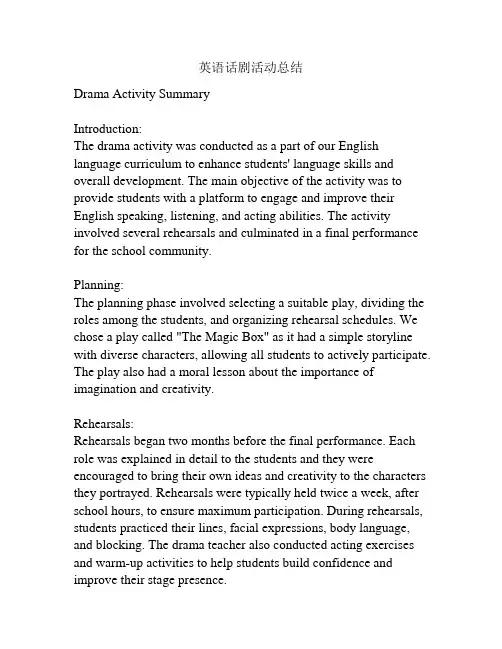
英语话剧活动总结Drama Activity SummaryIntroduction:The drama activity was conducted as a part of our English language curriculum to enhance students' language skills and overall development. The main objective of the activity was to provide students with a platform to engage and improve their English speaking, listening, and acting abilities. The activity involved several rehearsals and culminated in a final performance for the school community.Planning:The planning phase involved selecting a suitable play, dividing the roles among the students, and organizing rehearsal schedules. We chose a play called "The Magic Box" as it had a simple storyline with diverse characters, allowing all students to actively participate. The play also had a moral lesson about the importance of imagination and creativity.Rehearsals:Rehearsals began two months before the final performance. Each role was explained in detail to the students and they were encouraged to bring their own ideas and creativity to the characters they portrayed. Rehearsals were typically held twice a week, after school hours, to ensure maximum participation. During rehearsals, students practiced their lines, facial expressions, body language, and blocking. The drama teacher also conducted acting exercises and warm-up activities to help students build confidence and improve their stage presence.Challenges:The drama activity faced several challenges throughout its execution. One significant challenge was coordinating the schedules of all the participants and ensuring their regular attendance. Some students had conflicting commitments, such as sports practices and tuition classes, which affected their availability for rehearsals. Another challenge was the varying levels of English proficiency among the students. The drama teacher had to spend additional time explaining and practicing lines with those who struggled with pronunciation and comprehension. Additionally, stage fright was a common issue, and many students were nervous about performing in front of an audience. The drama teacher worked with each student individually to help them overcome their fears.Final Performance:After weeks of rigorous rehearsals and overcoming challenges, the students were finally ready to showcase their talents in the final performance. The play was staged in the school auditorium, which was filled with excitement and anticipation. The students' hard work was evident in their flawless acting, confident delivery of lines, and synchronized movements. The audience was captivated by the play and responded with laughter, applause, and cheers of appreciation. The students were thrilled to see their efforts pay off and hearts filled with a sense of accomplishment.Outcomes:The drama activity had several positive outcomes. Firstly, the students' English language skills improved significantly. Theyacquired a wider vocabulary, improved their pronunciation, and developed better listening skills. Secondly, the students' self-confidence and public speaking abilities also improved. Many students initially hesitant to speak in front of others gained confidence in expressing themselves through their characters. Thirdly, the activity fostered teamwork and collaboration among the students. They had to work together to create a seamless performance, supporting and motivating each other throughout the process. Finally, the drama activity enhanced the students' creativity and imagination as they crafted characters and brought them to life onstage.Conclusion:The drama activity was a resounding success, providing students with a unique opportunity to develop their English language skills and overall confidence. Through this experience, they gained an appreciation for the arts and developed skills that will be valuable to them in their future endeavors. The activity served as a reminder of the power of creativity and collaboration, leaving a lasting impact on the students' personal and academic growth.。
五年级英语话剧总结
五年级英语话剧总结
近日,我校五年级的学生们精彩上演了一台英语话剧。
这场话剧以生动活泼的表演形式展现了他们的英语学习成果,并向观众们展示了他们的才艺和团队合作精神。
这部话剧的主题是《探险之旅》。
故事发生在一个美丽的小村庄,几个勇敢的小朋友决定进行一次神秘的探险。
他们相信在村子后面的一片森林中有一个宝藏。
为了寻找宝藏,他们齐心协力,克服了一个又一个的困难。
在话剧中,每个角色都有自己独特的性格和任务。
领队小明勇敢坚毅,总是带领队伍前进,成为了大家的鼓舞人心的领袖。
小红是一个聪明伶俐的女孩,她总能给出明智的建议,帮助队伍克服困难。
其他队员们也各自发挥了自己的特长,大家紧密合作,共同解决了前进中的各种难题。
值得一提的是,这场话剧的表演不仅仅局限于英语对话,学生们还加入了音乐、舞蹈等元素,使整个表演更加精彩。
他们用流利的英语对话,清晰的发音和自信的表演赢得了观众们的阵阵掌声。
通过参与这部话剧,学生们不仅提高了他们的英语口语和表达能力,也锻炼了他们的团队合作和沟通能力。
他们学会了相互支持和尊重彼此的想法,在共同目标下取得了成功。
这场五年级英语话剧展示了学生们的才艺和激发了他们对英语学习
的兴趣。
希望这样的活动能继续举办,让更多的学生有机会展示自己的才华,并在快乐中提高他们的英语水平。
英语话剧工作总结Title: Reflection on my Work in Theatre。
Working in theatre has been an incredibly rewarding experience for me. Over the past few years, I have had the opportunity to work on a variety of productions, from classic plays to modern musicals. As I reflect on my work in theatre, I am reminded of the challenges and the joys that come with this unique and dynamic industry.One of the most important aspects of working in theatre is the collaborative nature of the work. From the actors to the directors, designers, and crew members, everyone plays a crucial role in bringing a production to life. I have learned the value of communication and teamwork, as well as the importance of being flexible and adaptable in order to meet the demands of a fast-paced and ever-changing environment.In addition to the collaborative aspect of theatre, I have also developed a deep appreciation for the power of storytelling. Theatre has the ability to transport audiences to different worlds, to evoke powerful emotions, and to provoke thought and discussion. As a member of the theatre community, I have had the privilege of contributing to the creation of these powerful narratives, and I have seen firsthand the impact that they can have on both the performers and the audience.Of course, working in theatre is not without its challenges. Long hours, tight deadlines, and limited resources are all common in this industry. However, I have learned to embrace these challenges as opportunities for growth and creativity. I have become more resourceful and resilient, and I have developed a strong work ethic that allows me to thrive in even the most demanding of circumstances.Looking ahead, I am excited to continue my work in theatre and to further explore the possibilities of this art form. I am eager to continue learning and growing, and I am grateful for the experiences and the relationships that I have gained through my work in theatre. It is a privilege to be a part of this vibrant and passionate community, and I am excited to see where this journey will take me.。
班级英文话剧活动总结_少先队班级活动工作总结
本学期,我们班开展了一系列有意义的活动,其中包括了英文话剧活动。
下面,我将对此次活动进行总结。
本次英文话剧活动是为了提高班级同学的英语综合能力,增进同学之间的友谊,营造浓厚的英语学习氛围而开展的。
活动分为三个阶段,分别是筹备阶段、表演阶段和总结反思阶段。
在筹备阶段,我们班特别成立了话剧组,组长班长带领我们在每周的下午集体活动时间里走访了学校图书馆和网上资源,最终选出了《Snow White》作为本次话剧演出的剧本,并在同学们的积极配合下,安排了角色分配、排练情况的核对、布景搭建、道具准备等工作。
在表演阶段,同学们通过反复排练,形成了最佳的表演状态,于6月15日晚在学校小剧场成功举办了英文话剧表演。
整场表演紧张而有序,我们班同学们以十足的热情和认真态度演绎了一个又一个经典的剧情,勇敢坦率的演技和大方得体的服装,赢得了现场观众的阵阵掌声。
在总结反思阶段,我们班开展了一次反思总结大会。
我们班成立的话剧小组首先做了一份活动的整体总结,对本次活动中存在的问题做出明确的反思和总结,以便活动能够更好、更深入的推广和发展。
随后,班主任老师进行了现场点评及互动交流,与班级同学共同畅想活动的未来效益。
通过本次英文话剧活动,我们班表演组同学很好的发挥了集体协作的精神,展现了高超的表演技巧,也让我们更好的体验了英语学习的乐趣。
同时,活动的成功举办全面提高了我们班学生的英语综合能力和整体氛围,增进班级之间的友谊,为今后的发展奠定了坚实的基础。
希望未来我们班还能举办更多有意义的活动,让我们在其中迎来更多属于我们的精彩时刻。
一、背景介绍本学期,为了提高同学们的英语口语表达能力,丰富校园文化生活,我们班级成功举办了以“友谊、团结、创新”为主题的英语话剧比赛。
经过精心的筹备和精彩的演出,本次话剧比赛圆满落幕。
以下是对本次活动的总结。
二、活动过程1. 筹备阶段在活动筹备阶段,同学们积极参与,纷纷报名参加。
在老师的指导下,同学们选择合适的剧本,分配角色,进行角色扮演。
在这个过程中,同学们不仅提高了自己的英语口语能力,还锻炼了团队协作能力。
2. 排练阶段在排练过程中,同学们克服了种种困难,如时间紧张、英语基础薄弱等。
在老师和同学们的共同努力下,各小组的表演水平得到了显著提高。
同时,同学们还通过查阅资料、请教他人等方式,对剧本进行了深入研究,力求将角色演得更加生动、形象。
3. 比赛阶段比赛当天,各小组纷纷登台亮相,为观众带来了精彩的表演。
同学们的表演充满了激情,既有幽默搞笑的片段,也有感人至深的台词。
观众们被同学们的表演深深吸引,现场气氛热烈。
三、活动成果1. 提高英语口语表达能力:通过参与英语话剧,同学们在日常生活中更加自信地运用英语进行交流,提高了英语口语表达能力。
2. 培养团队协作精神:在排练和比赛中,同学们学会了相互配合、共同进步,培养了团队协作精神。
3. 丰富校园文化生活:英语话剧比赛的举办,为同学们提供了一个展示自我、锻炼自我的平台,丰富了校园文化生活。
4. 增强班级凝聚力:在筹备、排练和比赛过程中,同学们紧密团结在一起,共同为班级争光,增强了班级凝聚力。
四、活动不足1. 部分同学英语基础薄弱,导致在排练和比赛中出现了一些语言错误。
2. 部分同学在表演中过于紧张,影响了表演效果。
3. 活动筹备时间较短,导致部分环节不够完善。
五、改进措施1. 加强英语学习,提高同学们的英语水平。
2. 在排练过程中,注重培养同学们的自信心,鼓励他们在舞台上发挥自己的优势。
3. 提前做好活动筹备工作,确保活动顺利进行。
总之,本次班级英语话剧比赛是一次成功的活动。
班级英文话剧活动总结_少先队班级活动工作总结一、活动背景为了丰富少先队员的课余生活,提高学生英语口语表达能力,激发学生学习英语的兴趣,我们在本学期组织了一场英文话剧活动。
本次活动旨在通过学生们的参与和表演,激发学生对英语学习的兴趣和热情,帮助他们在轻松愉快的氛围中提高英语口语表达能力。
二、活动准备1.选题策划:我们在选题时考虑了学生们的英语水平和表演能力,最终确定了一部简单而富有趣味的英文话剧《The Lion King》。
2.角色选拔:为了确保每个学生都能参与到话剧表演中,在选拔角色时,我们尽量让学生们选择自己喜欢的角色,并根据学生的英语水平和表演能力进行了合理安排。
3.排练演练:为了让学生们更好地理解和掌握角色,我们进行了多次的排练演练,老师们耐心指导学生们表演技巧和表达方式,确保他们的表演能够达到较好的水平。
4.舞台道具:我们认为道具对于话剧表演至关重要,所以我们准备了一些简单的道具和布景,用于增强话剧的视觉效果。
三、活动过程1.表演环节:在活动当天,学生们按照排练的顺序和节奏进行了话剧表演。
他们兢兢业业,认真演绎每一个角色,用英语流利地对白和动作表达展现了话剧的精彩。
2.互动环节:除了话剧表演,我们还设置了互动环节,老师和学生们共同进行了角色交流和情感表达,其中学生大胆挑战连台词对白,积极表达自己的观点和感受,大大提高了学生的英语口语表达能力。
3.总结评价:在活动结束后,我们组织了一个总结评价环节,让学生们自由发表对活动的感想和建议,激发学生的创造力和表达能力。
四、活动效果1.学生表现:活动中,学生们积极参与,表现出色,大部分学生能够流利地对白和表达情感,极大地提高了他们的英语口语能力。
2.团队合作:通过话剧表演,学生们学会了团队合作,互相帮助,共同挑战表演技巧,增强了班级的凝聚力和团结合作精神。
五、活动反思1.活动收获:本次英文话剧活动为学生们提供了一次难得的英语学习机会,让他们在欢乐的氛围中学会了快乐地学习英语,提高了他们的英语口语表达能力。
英语话剧的总结英语话剧的总结总结是指社会团体、企业单位和个人对某一阶段的学习、工作或其完成情况加以回顾和分析,得出教训和一些规律性认识的一种书面材料,它能够使头脑更加清醒,目标更加明确,因此我们需要回头归纳,写一份总结了。
总结你想好怎么写了吗?下面是小编整理的英语话剧的总结,欢迎大家借鉴与参考,希望对大家有所帮助。
英语话剧的总结1为了丰富大学生的文化娱乐生活,提高英语口语的学习能力,给学生提供一个展示自我的机会。
我材料学院学习部于20xx年12月2日面向大一大二的所有同学,在4C#405举办了一次"英语话剧"比赛。
本次比赛以班级为单位,每班一组成员参加比赛。
因为是英语话剧比赛,所以在比赛中,要想得冠,参赛者必须得有一口流利的英语,而且参赛者中途不得笑场,否则扣分。
我想我部人员又一次验证了"团结就是力量"这句话。
晚上6:00下课,而比赛在6:30正式开始,所以我部人员下课后马上到学生会集合,统一分工,集体行动。
搬音响,提水,现场布置装饰,买水果,邀请评委嘉宾这些工作竟然在15分钟内神速完成。
我部特地邀请了两位外国语学院的评委嘉宾,比赛结束后评委们对本次比赛赞不绝口。
首先,同学们的口语表达能力很强,使得他们在场上表演时毫无畏惧,毫不怯场。
这也更激发了其他同学学习英语口语的热情;其次,同学们的表演情节迭宕,内容别出心裁,这充分展示出了当代大学生思维的`设计创新能力和想象力。
我部人员负责赛前赛后的装饰和清理工作。
比赛期间,同学们自觉遵守会场纪律。
参赛者按照安排好的。
顺序有条不紊的上场下场,他们的表演给观众带来了不尽的欢乐,观众们也频频送以鼓励和支持的掌声,现场气氛和谐融洽。
唯一的缺点就是比赛结束后观众们有的人没有将自己留下的垃圾带走。
这次活动举办的非常出色,深受同学们的喜爱,同学们踊跃参加。
但同时也反映出了需要我们注意的几个细节问题。
需要我们努力的方面很多。
所以我们要进一步完善自己,以饱满的热情和积极的心态去对待每一件事情。
“英语小话剧”兴趣小组总结
“英语小话剧”兴趣小组本学期即将结束了,活动过程中在活动中,我们本着以学生为主体,教师为主导的原则,把活动设计为小组活动、英语编写活动、英语表演等形式。
通过开展英语第二课堂活动,提高了学生能力,也促进了英语课堂教学。
现对本学期的活动情况作以下小结:
一、增强了学生的自信心
英语第二课堂是以学生为主体的教学形式,学生是活动的中心,一切活动都是学生自己设计并参与,学生的个性得到了充分的发展。
在这些活动中,自由发言,学生敢于用英语参加这些活动,他们的自信心无形中树立了,合作意识增强了,养成了和谐和健康向上的品格。
同时,学生的视野也得到了拓展。
二、培养了学生的创新意识
英语第二课堂的活动有别于常规课堂教学活动,这些活动需要学生创造性地设计并参与,学生的创新思维和创新精神得到了充分的锻炼
三、增强了学生的合作精神
第二课堂活动需要学生的个体参与,学生的个人能力得到了充分的发挥,但是这些活动更多地需要学生间的合作意识,他们要主动向他人求教,愿意与他人分享各种学习资源,在英语交流中能理解并尊重他人的情感。
学生在活动中互相学习,取长补短,合作意识得到了极大的提高
四、英语第二课堂为学生的体验参与提供了一个平台
学生的情感和学习策略得以调整,学生的知识和技能提高了,学生在老师的指导下经历了磨砺意志、活跃思维、展现个性、发展心智和拓展视野的过程。
英语第二课堂优化了英语教学手段,提高了教学效率
本兴趣组仍存在很多不足,如:分组还不够细,要增加英语活动园地的英语氛围、活动形式要更多样化和科学化。
今后,本组将扬长避短,把英语活动组搞得更活、更好。